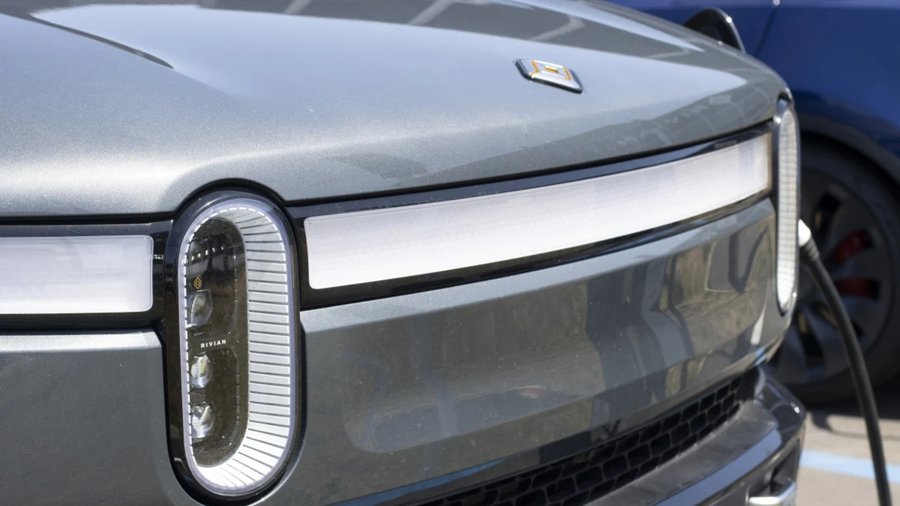Volkswagen And Rivian Are Teaming Up On Software In $5 Billion Deal

Rivian and Volkswagen are teaming up to create software for their future electric vehicles, the two automakers said Tuesday in a surprise announcement that includes a VW investment of up to $5 billion in the American startup automaker. Both companies are running into very different challenges ramping up their EV businesses, and the deal looks like it could be a win-win.
Under the terms of the expected deal, Volkswagen will invest an initial $1 billion in Rivian and plans to invest another $4 billion later on. Rivian says that will help fund its operations through the ramp-up of its upcoming mass-market vehicle, the R2 SUV. In exchange, Rivian will share its expertise on building software and electrical architectures and is expected to "license existing intellectual property rights to the joint venture," according to a press release.
"Both companies aim to launch vehicles benefiting from the technology created within the joint venture in the second half of the decade," the two companies said in a joint statement. "In the short term, the joint venture is expected to enable Volkswagen Group to utilize Rivian’s existing electrical architecture and software platform."
The first fruits of the joint venture will be seen in Rivian's R2 SUV, which is set to come out in 2026, Rivian CEO R.J. Scaringe said during a conference call on Tuesday. "Each company will continue to separately operate their respective vehicle businesses," the news release added.
While the two companies are technically competitors, the tie-up addresses areas where both find themselves deficient as the EV race heats up.
The Volkswagen Group, one of the world's largest carmakers, is practiced at churning out millions of cars a year across its many brands and selling them for a handsome profit. But, like other legacy manufacturers, it's struggled with software.
Old-school carmakers are all looking to integrate more software into their vehicles, enabling them to fix bugs, update features or sell you stuff with a simple software update. That vision—what the auto industry commonly refers to as software-defined vehicles—requires a dramatically different approach to vehicle design.
Modern cars have dozens of electronic control units (ECUs), little computers that control discrete parts of how a car functions and don't talk to one another. In order to make cars more "software-defined" and updatable through and through, automakers are working to develop software that's more integrated and standardized throughout a vehicle, and which runs on a smaller number of more powerful computers.
That's the hard part for manufacturers that have never had to design that kind of software or hardware before. Volkswagen's efforts to build new vehicle software and the electrical architecture it runs on have been delayed and fraught; it cleaned house at Cariad, its software division, last year.
Rivian, meanwhile, is widely regarded for its software and user experience. Its recently revised R1S and R1T vehicles showcase a new "zonal architecture" that allowed it to reduce the number of ECUs from 17 to seven and eliminate 1.6 miles of wiring from each vehicle. EV startups have the advantage of being able to develop things from scratch, and Rivian has apparently benefited greatly from that flexibility. What it lacks is money.
A few years into selling cars, the California-based startup is still unprofitable. And it needs to stay above water until it can ramp up production of the $45,000 R2 SUV starting in 2026. Today, Rivian sells the relatively expensive R1T pickup and R1S SUV.
Those can't sustain the kind of sales volume Rivian needs to cross the so-called "valley of death" and enter the promised land of financial health. The VW deal may serve as a badly needed financial cushion as Rivian scales up to the day when it can achieve mass-production and hopefully long-term stability. At least, that's what Rivian expects.
In a shareholder letter on Tuesday, the startup said that the money from VW, plus existing funds, "are expected to provide the capital to fund Rivian’s operations through the ramp of R2 in Normal, as well as the midsize platform in Georgia—enabling a path to positive free cash flow and meaningful scale." It's important to note, though, that $2 billion that VW plans to invest in Rivian depends on the startup meeting certain financial and technological milestones.
Earlier this year, Rivian said it would postpone the launch of a new factory in Georgia and start production of the R2 at its existing plant in Normal, Illinois, instead. That move would save it around $2.25 billion. On Tuesday, Rivian also said it expects the joint venture to help it operate more efficiently and reduce its operating costs.
